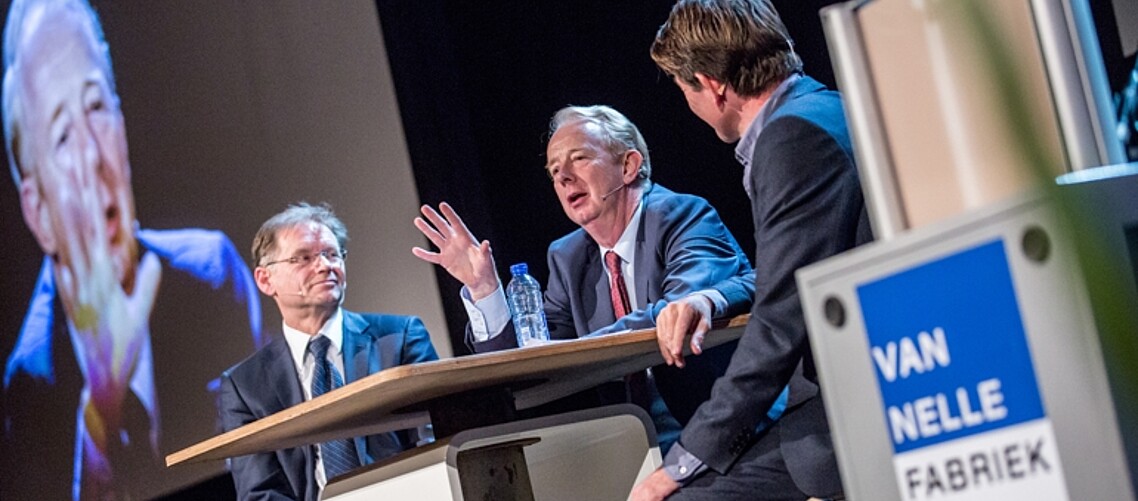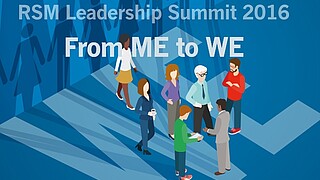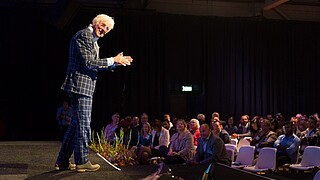A range of very human and personal stories demonstrating leadership were shared by Marijn Dekkers of Bayer AG, Dorothee van Vredenburch of NN Group, and Merel van Vroonhoven of AFM. A full report of the RSM Leadership Summit can be read online.
Marijn Dekkers, chairman of the board of management of German pharmaceutical multinational Bayer AG said such events mean leadership must create a positive environment and be more forward-thinking for a global workforce. New business models and a careful ear to stakeholders such as politicians, customers and employees are important. “Only bars can still sell their products the same way they did before,” he commented.
Listen to your employees
Dutch-born Dekkers has been a CEO in two companies on two continents. “Growing up in a small country like the Netherlands forces you to be aware of countries around you,” he said, and told the audience that people are often obsessed with the five per cent of unfamiliar situations. Instead, he advised to focus on the other 95 per cent. “I tried to adapt more to Bayer than Bayer had to adapt to me,” he said, adding that appraisals with employees often provide information about the unfamiliar five per cent.
Dekkers said he gets a kick out of the challenge of seeing what he can do with his talents, but telling people what to do was not always the best way. He admitted that he still makes mistakes but leaders should never use arrogance.
Enter with sensitivity
Professor Rob van Tulder from RSM’s Department of Business-Society Management agreed that entering an existing culture with sensitivity was a good approach to management. Companies need a value proposition to align themselves with society. “It’s about thought leadership,” he said and advised being open to bringing in critical partners because they help to address challenging issues.
How you make them feel
Dorothee van Vredenburch, member of the management board at NN Group has responsibilities that include communications, branding, and the Group’s own corporate citizenship programme. She strives to connect three levels of communications; the rational, the emotional, and the intuitive; to serve the purpose, the people and their performance.
“Your living assets are your connections with stakeholders – customers, employees, regulators, and society at large,” said Van Vredenburch, and remarked that a leader’s survival kit should also contain a big dose of trust. She said leadership is about being, not doing: “People will forget what you say, but they will always remember how you made them feel.”
Crash course in body language
RSM’s Professor Joep Cornelissen gave the audience a crash course in using ‘the body language of leaders’ to be more persuasive with tips about using framing, analogies, metaphors and storytelling, and using an animated tone of voice and body language to convince customers, investors and employees.
Investors typically look for a well-prepared pitch and an impassioned entrepreneur with convincing body language, facial expressions and tone and pitch of delivery. “These skills really matter,” said Cornelissen.
A new way of looking
Merel van Vroonhoven, chairman of the executive board at Netherlands Authority for the Financial Markets (AFM), told the audience that leadership is a balance between autonomy and connection, and her mission is to make connections to people and to herself. “You can’t have a connection without autonomy. Otherwise, you connect too closely; you lose your own values, and identity – you lose yourself.” Van Vroonhoven is also vice-chairman of the board of the Dutch Association for Autism (NVA) and added that this connection seems easier when people work in voluntary organisations.
“People with autism see the world differently. My autistic son taught me to look at things in a new way,” said Van Vroonhoven. “Look at the talents of the person you’re dealing with. People with autism might not be good in everything, but they’re good in IT and planning. They can be a good employee in times of change when you need innovation,” she said.
Her role as leader of the organisation regulating Dutch financial markets requires her to stay autonomous and tough, while accepting feedback and gaining trust. For this, Van Vroonhoven created a stakeholder arena for feedback from employees. “As management, we had to listen,” she said. “It’s very powerful when your stakeholders give you this kind of feedback.”
No bonus, no incentive?
Professor Lucas Meijs, professor of volunteering, civil society and businesses and strategic philanthropy at RSM, said leaders who want to create sustainable change must operate in both the business sector and civil society. Volunteering experience can enhance leadership skills, said the professor, because leaders of such organisations have limited powers and can’t use bonuses as incentives.
Meijs, who teaches masterclasses in non-profit management, called for companies to organise social campaigns together.
From subconscious gesturing to dealing with failure
The speakers’ presentations prompted wide-ranging questions from the audience; they covered learning new perspectives from travel, subconscious gesturing, belonging to communities, volunteering, listening and being authentic, gender diversity in leadership, finding a company that suits you, and seeing the value in someone who’s different to you to contribute to diverse teams, the work-life balance, bad motivators for gaining followers, and finally, dealing with failure.
Distinguished alumni
During the RSM Leadership Summit, two alumni were presented with the RSM Distinguished Alumni Awards 2015; Stef van Dongen (MSc Business-Society Management 2007) and Niels Eldering (MSc in Technology and Innovation Management 2003) were honoured for their contributions to business and society.
The RSM Leadership Summit’s full report is available online.


